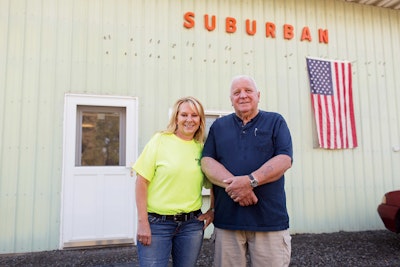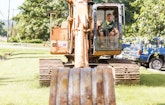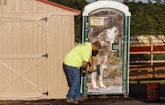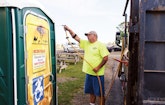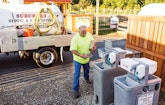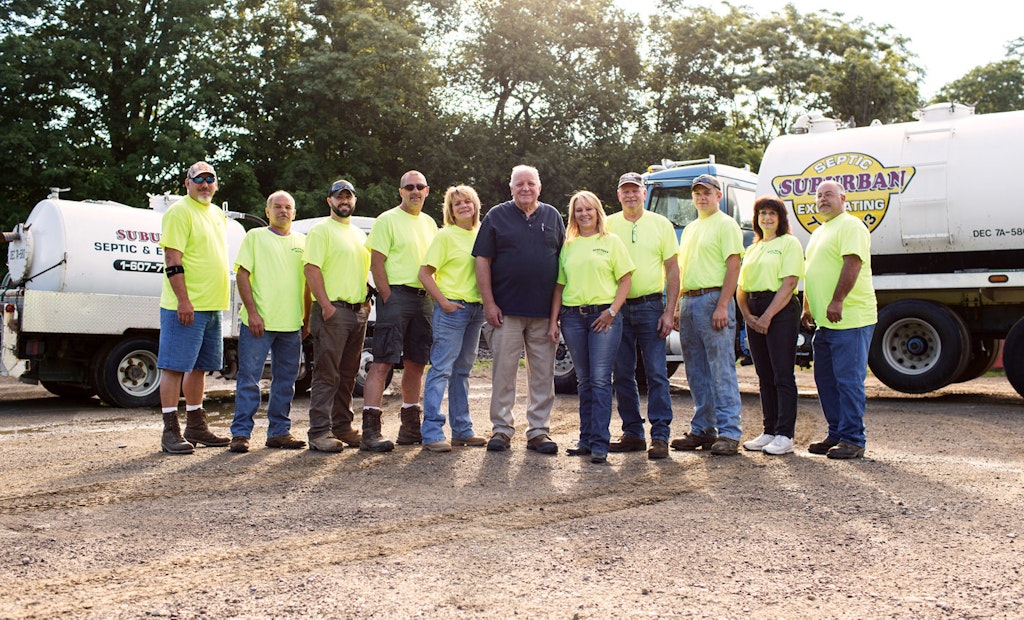
Interested in Portable Sanitation?
Get Portable Sanitation articles, news and videos right in your inbox! Sign up now.
Portable Sanitation + Get AlertsIn 1957 when Gordon Hoover Sr. established Suburban Septic in Kirkwood, New York, the company’s main focus was pumping septic tanks. Today, in its third generation of family ownership — with a fourth possibly waiting in the wings — the company now derives more of its revenue from portable sanitation than septic service.
How that story line unfolded during the last 60 years underscores the importance of seizing new opportunities to expand into markets with similar needs for equipment and skill sets. It also reflects the value of taking calculated risks to diversify services and reduce the risks posed by relying on one primary revenue stream.
“It was never part of the original plan,” says Rod Hoover, the company’s second owner, now semiretired. He assumed ownership of the business from his father in 1986 and incorporated it.
“But when a local restroom operator retired in the early 1970s, my dad had the foresight to try it and it took off from there,” Rod continues. “We thought the market would mostly be construction rentals, but the market kind of evolved on its own. … We started getting calls from local towns, parks and private parties. And it seemed like the more restrooms we bought, the more we rented.”
The takeaway there? “If you’ve got a hunch, go with it,” Rod says. “I firmly believe you can make anything work if you work hard enough at it.”
A TIME OF GROWTH
The company started with just 50 restrooms. Now, it owns 600 units, primarily from PolyPortables. The company also owns 100 hand-wash stations, also from PolyPortables, says Yvonne Hoover, 51, who became owner of the company in September 2016 and has been an employee for the last 30 years.
“I never envisioned owning 600 restrooms,” Yvonne says. “In fact, when I first started working here in my early 20s, I didn’t think much of restrooms — it didn’t seem like a very glamorous business. But now, I can’t wait to own more. It’s great for our overall business.”
Restrooms contribute to about 65 percent of the company’s income, with septic pumping producing roughly another 30 percent. Smaller services such as pool-water delivery and snow plowing generate the balance. The two major business sectors mesh well together. During summer months, the restrooms generate consistent cash flow. During winter, when restrooms rentals slow down, septic tank pumping shoulders the revenue load.
The company also uses the restrooms to cross-promote its other services. She says, “We have a sign in each restroom that promotes our septic services as well as our snow-plowing and pool-water delivery services,” Yvonne explains. “It generates a fair amount of business for us.”
The company also relies on business cards, direct-mail postcards and refrigerator magnets to promote its services. Invoices carry the same information, and sometimes the company includes a $10 coupon, valid if used for a complementary service.
RENTAL BREAKDOWN
Roughly half of the company’s restrooms are devoted to monthly rentals at construction sites, parks and the like that are located in and around Kirkwood, which is about 75 miles south of Syracuse in upstate New York. The remaining units are used for special events such as local town fairs and the annual Lumberjack Festival, held in nearby Deposit, New York.
One of Suburban Septic’s more unusual restroom customers is Animal Adventure Park in nearby Harpursville, New York, which features hands-on encounters with domestic and exotic animals. Yvonne had some of the more than 30 restrooms at the park covered with vinyl wraps depicting various animals.
To service the park, route drivers use the company’s self-fabricated 2014 Mitsubishi Fuso Canter FE160 service truck, which features a 600-gallon waste and 300-gallon freshwater steel tank. The truck’s engine is very quiet, which makes it well-suited for servicing the animal park.
Yvonne says, “We get up early in the morning, usually around 5 a.m., so we can get there and get out by 7 a.m. Some of the animals are in pens and others roam free, so you have to watch out for turkeys, peacocks and rabbits, for example. It’s pretty awesome.”
The company also does business in northeastern Pennsylvania; the state line is about 5 miles south of Kirkwood. Before the oil and gas market slumped, Suburban Septic had built a good business supplying restrooms for natural gas drilling rigs. Many of the rigs the company served are no longer operating, but Yvonne says she still rents restrooms to production companies’ compressor stations, where natural gas is prepared for pipeline transport.
FLEET FACTS
Suburban Septic has a formula for paying off the investment in new equipment. “We charge a monthly rate that’s fair but also high enough to pay off new restrooms fairly quickly,” Yvonne explains. “And if they’re damaged, lost, or stolen, we charge a fee. When it comes to adding new restrooms, I’d rather strike while the iron is hot.”
More often than not, if one segment of the restroom customer base slumps, another picks up the slack. For example, the drop-off in the energy sector was offset by construction areas requiring additional restrooms.
In addition to the 2014 Mitsubishi Fuso, the company relies on four restroom service trucks: a 2017 Mitsubishi Fuso Canter FE180 with a 300-gallon waste and 100-gallon freshwater stainless steel tank built in-house; a 2005 Chevrolet C5500 that’s currently being rebuilt; a 2003 GMC outfitted by Crescent Tank Mfg. with a 550-gallon steel wastewater tank and a 300-gallon plastic freshwater tank; and a 2001 Ford F-350 outfitted with a 250-gallon waste and 100-gallon freshwater stainless steel slide-in unit. A 1992 Chevrolet stake truck is used to deliver and pick up restrooms; it carries up to eight units.
On the septic side of the business, the company runs two vacuum trucks: a 2004 Mack with a 4,500-gallon steel tank built by Pik Rite and equipped with a Masport pump; and a 1987 Mack with a 2,500-gallon steel tank and Masport pump.
In addition, the company owns a 5,500-gallon Walker tanker trailer (a brand owned by Wabash National), used to transport water for filling pools. A 2000 tractor from Freightliner Trucks A Div. of Daimler Trucks NA is used to tow the tanker. The company also owns an excavator made by Kubota Tractor Corporation, as well as an excavator, two backhoes and a bulldozer manufactured by Case Construction Equipment (owned by CNH Industrial America). Rounding out the fleet is an assortment of trailers made by General Trailer Co., Eager Beaver Trailers, Kaufman Trailers, Quality Trailers and Wee Engineer.
HARD WORK PAYS OFF
What has enabled the company to thrive for 60 years? “I’ve wondered that myself sometimes,” Yvonne says with a chuckle. “But I think it comes down to my grandfather and my father were very hard workers, which rubbed off on me. We take a great deal of pride in what we do.
“Also, my grandfather and my uncle (Gordy) were born with a knack for being able to fix just about anything and run any kind of equipment,” she adds. “Uncle Gordy is our full-time mechanic, and if we need something fixed or built, well, there’s nothing he can’t do, whether it’s in our garage or 20 miles down the road where a truck might need a new belt. You just can’t put a value on that.”
Yvonne also credits her dad with instilling in her a sense of confidence that allows her to succeed in a male-dominated industry. “He helped me learn to stand up for what I believe in,” she says. She also states that the value of longtime employees cannot be underestimated.
Looking ahead, Yvonne doesn’t see dramatic changes, just continued growth. She’s working on fulfilling the requirements for becoming a certified woman-owned business enterprise. It’s a time-consuming process, but would make the company eligible for minority set-aside contracts. “That could really increase our revenue,” she notes.
Her long-range goal is buying one more restroom truck, another septic vacuum truck and 100 more restrooms within the next three years. “That would require us to branch out more geographically, where we’d run into stiffer competition,” she says. “That’s where providing great customer services comes in because those local outfits will be able to do the job cheaper than we can.”
Looking even further down the road, Yvonne says she’d love to have her nephews — brothers Christopher and Louis Wach — eventually take over the business when she retires. “We’re lucky because they both work very hard,” she says. “They make me very optimistic about the future. If our crew sticks with us in the years ahead, we can do just about anything.”
Recruiting workers
Suburban Septic & Excavating Services is considering investing in a vacuum truck equipped with a rear-opening door and hoist to make service calls at car wash pits more practical. Without a hoist, silt from the pits is too hard to remove from the tank, says owner Yvonne Hoover. But buying another truck would require hiring another employee, and like many other pumpers nationwide, Yvonne is learning it’s difficult to find quality workers interested in the septic industry.
“Just when you think you have someone good, they quit to take another job or move away,” she says. “No one wants to do physical labor anymore. Or they want to start at $25 an hour. Or they have no common sense — we’ve had guys show up to work in their slippers!”
To keep good employees on board, the company raised its starting pay to $18 or $19 an hour. If they perform well, workers eventually could make up to $25. The company also offers one week of paid vacation after a year, and if employees work the day before and the day after a holiday, they get paid for the holiday.
Another key is treating good employees like family. “If they need help, we’re there for them,” she notes. “If they need a car repair and don’t have enough money, we’ll pay for it.” Why? “Because good employees are like gold,” she explains. “You have to go through a lot of people in order to find just one good one.”
Yvonne says she’s had good luck recently using the company’s Facebook page as a recruiting tool. She posts photos of employees at work, which are shared with family and friends. She also posts job openings when they arise. “It’s led to us some good employees,” she says.
Along with Yvonne and her semiretired father, Rod, the current roster of employees includes Gordy Hoover Jr. (Yvonne’s uncle), a mechanic; Walter Wach Jr., a manager, equipment operator and foreman who’s married to Yvonne’s sister, Christine, who is the company’s corporate secretary; Louis Wach, an on-call laborer who’s Yvonne’s nephew; Christopher Wach, another nephew, who’s a laborer and driver; Ed Fisher, a septic technician; Dan Cadwell and Rob Cron, portable restroom technicians; Dicky Becker II, groundskeeper and portable restroom technician; and Shelley Terry, administrative assistant.
